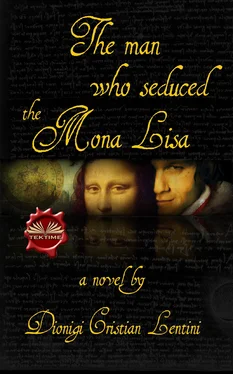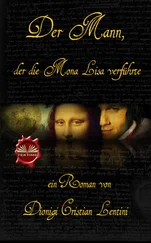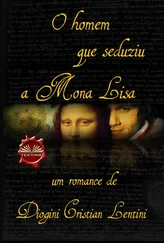Near the Cathedral square, two girls had just given a piece of bread to a poor, cold beggar and were preparing to return home. Tristano suddenly jumped from his horse and pointing at the two young people exclaimed:
“Alessandra!”
The slimmer of the two turned abruptly, looked for a moment at the one who had dared to call out her name at that late hour and, receiving confirmation by seeing how much that sound had just aroused in her casket of memories, replied:
“Tristano”
In an instant she was running towards him and without convention or inhibition, as between young people who had already shared more than a little, she threw her arms around his neck, gently closing her eyes and resting her head on the chest of the unexpected stranger.
Alessandra was the lovely daughter of Madonna Lucrezia Buti and the late Florentine painter Filippo Lippi. Her mother, formerly Sister Lucrezia, had been a nun at the monastery of Santa Caterina, constrained by the family, forced to be a nun. Her father, chaplain of the convent at the same monastery in Prato, was already recognized as one of the best painters of his time and, therefore, ecclesiastical hierarchies and the wealthiest families commissioned him to paint very important works, especially having a biblical and hagiographic subject. It was during one of these works that the two had met. The attraction was inevitable and irrepressible… she very beautiful and sensual, he very charismatic and sensitive: the two religious people fell madly in love. The sinful relationship within the sacred walls of the convent lasted for some time, during which Sister Lucrezia willingly lent herself as a model for some paintings by Fra' Filippo, until the latter, on the occasion of the procession of the Holy Belt, decided to kidnap his beloved and start a new life with her as concubine, regardless of the sensation, scandal and general disapproval. Obviously the Church strongly opposed the bond between the two, labeling it as lustful and even diabolical; only years later, thanks to the intercession of Lippi's protector, Cosimo de' Medici, with the Holy Father, the two were finally reformed and obtained the dissolution of the vows. So a few years later the beautiful Alessandra was born.
Tristano had known and visited the uninhibited girl during his stays as an adolescent in Florence at the house of the Medici and had immediately been impressed and attracted, even before the appearance of her gentle features, open-mindedness, extroversion and her intellectual independence, characteristics that she had certainly inherited from both parents, of which she intrinsically embodied the modus cogitandi et operandi .
Now, after almost five years, he saw her again. She was even more beautiful, even more a woman.
The two entered the house, while the rest of the company waited outside.
There was just enough time to tell the owner of the house what had happened a few hours earlier and the two friends went back outside, inviting the others to make themselves comfortable in the house. Despite the late hour, Alessandra sent for a doctor, arranged the rooms for the guests and assured Tristano generously that she would take care of them, together with her mother, until the wounded had recovered completely.
Thus, while a sincere glass of wine accompanied the convivial tales of the welcome guest and accentuated the blush on the cheeks of the graceful landlady, Ipno and his Oneiroi slowly descended on the city of Prato.
The following day, immediately after the morning praises, the young envoy, duly thanking for the hospitality, resumed his journey to Rome with his escort, where his protector was eagerly awaiting him… and with this last another compelling mission to accomplish.
It was therefore necessary to make up for a few hours of travel, possibly avoiding other unexpected occurrences.
No more than a hundred feet outside the inhabited area, on the dusty road to Florence, the three papal knights had just begun to increase their speed when they were joined by a man on horseback with a showy bandage between his arm and shoulder.
“Sir… Sir, please. Stop…”
The breathless man was the same one Tristano had just saved and had a short while before entrusted, together with his woman, to the care of the Lippi house. The papal officer had to stop again.
“Please, my lord, listen to me,” continued the imploring supplicant, “What you have done and demonstrated is more noble than any coat of arms that adorns your breast and any crown that dominates your family coat of arms.”
Then, getting off his horse, he prostrated himself before the diplomat:
“Allow me to show you my eternal gratitude and offer you my services only as a partial restoration of the unquenchable debt that I contracted when Your Excellency stole me and even more my woman from the murderous ferocity of those brutes. This entire night I could not help but think about what happened and decided, if you accept, I offer you, without asking for anything in return, my humble sword and I swear my loyalty to you as long as you permit me to serve you.”
Tristano, for the high office he held, was certainly not short of protection and frankly until then he had always managed on his own… but he saw in the eyes of that man, who almost implored him, a particular light and a sense of sincere gratitude, loyalty, disinterest, something out of the ordinary. So much so that, without the humble person being able to add anything else, he asked:
“What's your name, brave man?”
“Pietro Di Giovanni, my lord,” he replied, raising his head.
“Get up Pietro. Given the delay that I am augmenting because of you, alas, your protection against the wrath of my lord will not be sufficient… I have no blazons or coats of arms to display, but I appreciate your gratitude and accept your services. But now, if you care so much, before I think any more about it, get on your horse and let's move on without further delay.”
And so the group resumed their race towards the Eternal City.
IV
The Magnificent’s ring
Giuliano de' Medici and Simonetta Vespucci
Pietro, a mature man, uncouth, scruffy in appearance but not that rough, was very skilled with the sword (with what he had inherited from his father he had attended the Bolognese school of Lippo Bartolomeo Dardi); he was endowed with an excellent technique and, although no longer young, he was physically well prepared; he did not like to call himself a mercenary, but, like many others, he had hitherto earned a living in the pay of one or other noble, taking part in the many battles and brawls that in those years animated the entire peninsula.
During the journey, at a time they had slowed their pace, the swordsman came up beside Tristano and, being careful never to let the muzzle of his horse go in front of that of his new lord, he dared ask:
“Will you allow me, a question Your Excellency?”
“Of course Pietro, ask me,” replied the distinguished official, turning his head a few degrees towards his daring assistant.
“How did you get that ring, sir? Is it really the Magnificent’s ring?”
Tristano was silent for a few moments giving a half smile but then, certain that he could trust this man, whom he had known for a few days but who he valued already, let go of his reserve and began his story:
“Seven years have passed since Cardinal Orsini took me with him to Florence for the first time, following a medical delegation that had been created specifically to provide assistance to His Most Reverend Excellency, Rinaldo Orsini, archbishop of Florence, he had been ill for two weeks with no sign of remission. Once I arrived in the city, while the physicus with his apprentices – among whom was my friend Jacopo – were immediately sent to the diocese to be at the bedside of the suffering prelate, the cardinal took me with him to Madonna Clarice, his granddaughter and wife of Lorenzo de' Medici, the Magnificent.
Читать дальше












